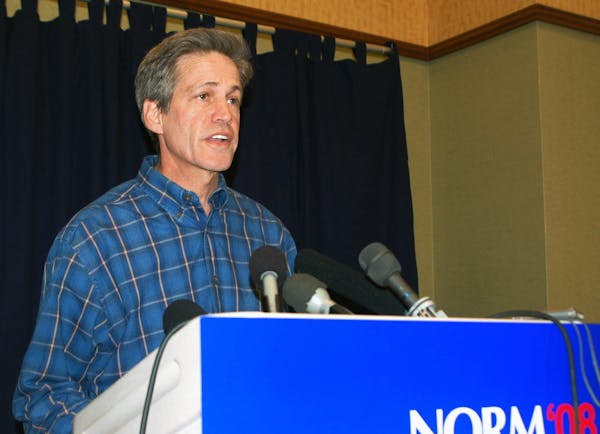WASHINGTON -- Alicia Strange, a newly registered Minnesota voter, has waited decades to cast her first vote. At 45, she doesn't care if long lines keep her waiting a few more hours.
"I'm just going to take my time and let it all marinate," said Strange, a security guard from Brooklyn Park who remains undecided in the presidential race.
Election officials are hoping others will be just as patient. With a record 600,000 Minnesotans expected to register to vote on Election Day, poll watchers are bracing for a long day -- and maybe a longer night.
Meanwhile, across the nation, with millions of other new voters expected, one research organization is warning of a "perfect storm" of complicating factors: record turnout, too few poll workers and voting systems that have been in flux for years.
Minnesota officials say they are prepared, though they anticipate long lines in some polling places, particularly in the Twin Cities.
"There could be a quarter of a million people on the move on Election Day in Minneapolis," said Cindy Reichert, the city's elections director. "We're confident. Not to say that there won't be a few glitches."
But in other states, analysts say the combination of record turnout and highly partisan legal maneuvering could make this one of the most contentious Election Days in history.
The NAACP has already sued the state of Virginia, saying officials aren't prepared for the onslaught of new voters. Florida has already seen disputes over long lines at early voting centers. And Ohio has been embroiled for months in Republican voter registration challenges.
"We're seeing a system tested in a big way," said Doug Chapin, director of electionline.org, a nonpartisan group that is tracking voting systems nationwide.
Electionline.org, a project of the Pew Center on the States, has just issued a report warning that "another perfect storm may be brewing" eight years after the Florida recount standoff that delayed the final results of the 2000 presidential election by more than a month.
This time, the concern is not Florida's punch-card technology and its infamous "hanging chads." That gear has been largely discarded in favor of electronic touch-screen and paper-based optical scanner systems, used in Minnesota.
Instead, some experts worry about a combination of massive nationwide turnout and new and unfamiliar voting systems that have been put in place in many states since 2000.
With Florida and dozens of other states modernizing their voting systems with each successive election, it remains to be seen if all 50 states and the District of Columbia can handle this year's expected load.
"The trick is we don't really have a system that's organized, designed or funded to handle anywhere near 100 percent turnout," Chapin said. "And this year we'll probably get closer than we ever have."
Adding to this year's volatile mix of Election Day problems are new voter ID rules and eligibility challenges that have become a critical point of contention in battleground states such as Ohio and Indiana.
Indiana, along with Georgia, will require voters to present government-issued photo identification for the first time in a presidential contest, a practice that a number of voting rights advocates, including Rep. Keith Ellison, D-Minn., challenged unsuccessfully before the U.S. Supreme Court.
Ohio has experienced a half-dozen voter registration lawsuits. There, and elsewhere, the table has been set for widespread use of voter challenges, both before and during the voting. The Obama and McCain campaigns have both been beefing up their legal staffs accordingly.
Meanwhile, outside observers worry that the pressure of long lines, record numbers of new registrants, and strict "no match, no vote" policies might lead to simple clerical errors that could disqualify otherwise eligible voters -- what Michael Waldman of the Brennan Center calls "disenfranchisement by typo."
For other voting rights activists, the prospect of long lines is itself a civil rights issue. "Voters should not be forced to wait hours in line in order to exercise their fundamental right to vote," said John Bonifaz of Voter Action, a national legal advocacy group.
In some states, voters who are denied a chance to vote because of registration or voter ID problems will be offered provisional ballots, which are counted only after the challenges are cleared up. Owing to the variety of state rules governing provisional ballots, voting experts for electionline.org say they "may be the hanging chad of 2008."
Minnesota, one of eight states with Election Day registration, does not use provisional ballots. That and other measures may help the state avoid a lot of the pain other states might experience on Tuesday.
State law requires voter challenges to be made in writing only by state residents who can cite personal knowledge of potential fraud. This is designed to minimize the role of "hired guns" from national campaigns, according to Ramsey County election manager Joe Mansky, an authority on the state's voting system.
Anticipating record turnout, election officials in Ramsey and Hennepin counties have hired extra election judges and other poll workers this year, including "greeters" who will work the lines and ensure voters are in the right place with the right documents.
With a record 3.2 million registered voters, Minnesota officials also are encouraging people to vote early in the day; a longstanding state law requires employers to give workers paid time off to vote.
Minnesota Secretary of State Mark Ritchie is aiming for 80 percent voter turnout, a slight improvement over 2004's nation-leading 78 percent.
Just in case, first-time voter Strange plans to get up early to vote. She had a brush with the law that put her in jail when she was a teenager, so she thought that made her ineligible to vote, and only recently found out she could vote. "This is very big for me," said the Brooklyn Park grandmother. "I'm going to be a part of history."
Kevin Diaz • 202-408-2723

Jill Biden rallies women, teachers for the Biden-Harris ticket in Bloomington speeches

